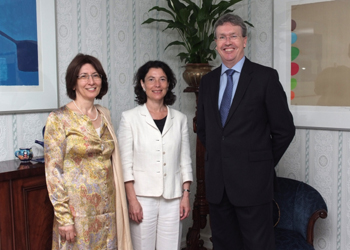Lancaster gender expert appointed to UNESCO Chair

Gülser Corat, Director UNESCO Division of Gender Equality, Professor Sylvia Walby and Vice-Chancellor Professor Paul Wellings
Professor Sylvia Walby from Lancaster University has been made the UNESCO Chair of Gender Research. Part of her role will be to plug the gap in the information available about gender issues world wide.
UNESCO - the United Nations Educational, Scientific and Cultural Organization functions as a laboratory of ideas and a standard-setter to forge universal agreements on emerging ethical issues.
The appointment was launched with a high profile UNESCO/ Economic and Social Research Council (ESRC) event and seminar at Lancaster which addressed gender equality in a global era attended by leading international experts in gender and equality.
Professor Walby, who has been a professor in the Sociology Department at Lancaster since 2005, sees her task as improving global statistics and indicators to help properly inform the authorities so issues like domestic violence, which is estimated to cost the UK economy and services billions every year, can be effectively addressed.
“Targeting inequalities in gender globally is a way to relieve huge issues such as violence against women, poverty, and boosting human and economic development in North and South”, explains Professor Walby. “But we need to know the extent of the problems and get usable figures in order to know whether policies are working or not.”
Professor Walby will be coordinating international researchers in the field of gender research and will help develop research which directly relevant to informing the policy debate on gender inequalities. She will also work with the policy makers to keep them informed of the latest research.
Peter Landymore, Ambassador and Permanent Delegate to UNESCO said:
Effective access to the right to equal treatment irrespective of gender remains elusive in many parts of the world, particularly in the poorest countries. Finding better ways, through the UN system and by other channels, to make a reality of gender equality – especially in basic education - is an important goal for the Government, and one to which we believe UNESCO has an important contribution to make.”
“I’m sure the new chair will make an impressive contribution to the work of UNESCO focus on gender equality, and to wider knowledge and better policies.Professor Walby has previously held Chairs at the Universities of Bristol and Leeds and a Readership at the LSE. She has been a research consultant for the United Nations Division for the Advancement of Women (UNDAW) and the United Nations Economic Commission for Europe (UNECE) on the development of indicators of gender-based violence. Previous research, funded by the Economic and Social Research Council (ESRC), Equal Opportunities Commission (EOC) and the Government’s Women and Equality Unit has focused on gender, productivity and employment. Current research funded by the European Union Commission and also by the UK Equality and Human Rights Commission concerns the meaning and measurement of gender equality. She is the author of many books: forthcoming is Globalization and Inequalities: Complexity and Contested Modernities (Sage 2008).
Web-site: http://www.lancs.ac.uk/fass/sociology/profiles/34/